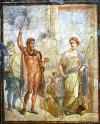Hvem giftet seg med Alexander the Great?
Roxana gift Alexander the Great i .
Parysatis II gift Alexander the Great i .
Ekteskapet ble avsluttet i .
Stateira gift Alexander the Great i .
Ekteskapet ble avsluttet i .
Alexander the Great

Alexander III of Macedon (Ancient Greek: Ἀλέξανδρος, romanized: Aléxandros; 20/21 July 356 BC – 10/11 June 323 BC), most commonly known as Alexander the Great, was a king of the ancient Greek kingdom of Macedon. He succeeded his father Philip II to the throne in 336 BC at the age of 20 and spent most of his ruling years conducting a lengthy military campaign throughout Western Asia, Central Asia, parts of South Asia, and Egypt. By the age of 30, he had created one of the largest empires in history, stretching from Greece to northwestern India. He was undefeated in battle and is widely considered to be one of history's greatest and most successful military commanders.
Until the age of 16, Alexander was tutored by Aristotle. In 335 BC, shortly after his assumption of kingship over Macedon, he campaigned in the Balkans and reasserted control over Thrace and parts of Illyria before marching on the city of Thebes, which was subsequently destroyed in battle. Alexander then led the League of Corinth, and used his authority to launch the pan-Hellenic project envisaged by his father, assuming leadership over all Greeks in their conquest of Persia.
In 334 BC, he invaded the Achaemenid Persian Empire and began a series of campaigns that lasted for 10 years. Following his conquest of Asia Minor, Alexander broke the power of Achaemenid Persia in a series of decisive battles, including those at Issus and Gaugamela; he subsequently overthrew Darius III and conquered the Achaemenid Empire in its entirety. After the fall of Persia, the Macedonian Empire held a vast swath of territory between the Adriatic Sea and the Indus River. Alexander endeavored to reach the "ends of the world and the Great Outer Sea" and invaded India in 326 BC, achieving an important victory over Porus, an ancient Indian king of present-day Punjab, at the Battle of the Hydaspes. Due to the mutiny of his homesick troops, he eventually turned back at the Beas River and later died in 323 BC in Babylon, the city of Mesopotamia that he had planned to establish as his empire's capital. Alexander's death left unexecuted an additional series of planned military and mercantile campaigns that would have begun with a Greek invasion of Arabia. In the years following his death, a series of civil wars broke out across the Macedonian Empire, eventually leading to its disintegration at the hands of the Diadochi.
With his death marking the start of the Hellenistic period, Alexander's legacy includes the cultural diffusion and syncretism that his conquests engendered, such as Greco-Buddhism and Hellenistic Judaism. He founded more than twenty cities, with the most prominent being the city of Alexandria in Egypt. Alexander's settlement of Greek colonists and the resulting spread of Greek culture led to the overwhelming dominance of Hellenistic civilization and influence as far east as the Indian subcontinent. The Hellenistic period developed through the Roman Empire into modern Western culture; the Greek language became the lingua franca of the region and was the predominant language of the Byzantine Empire until its collapse in the mid-15th century AD.
Alexander became legendary as a classical hero in the mould of Achilles, featuring prominently in the historical and mythical traditions of both Greek and non-Greek cultures. His military achievements and unprecedented enduring successes in battle made him the measure against which many later military leaders would compare themselves, and his tactics remain a significant subject of study in military academies worldwide. Legends of Alexander's exploits coalesced into the third-century Alexander Romance which, in the premodern period, went through over one hundred recensions, translations, and derivations and was translated into almost every European vernacular and every language of the Islamic world. After the Bible, it was the most popular form of European literature.
Les mer...
Roxana

Roxana (baktrisk: Roshanak) var den baktriske konen til Aleksander den store, ble født tidligere enn år 347 f.Kr., selv om den nøyaktige datoen forblir ukjent. Hun var datter av en adelsmann som het Oxyartes av Balkh i Baktria (da det østlige Persia, nå nordlige Afghanistan).
Hun giftet seg med Aleksander i 327 f.Kr. etter at han fanget henne da festningen i Sogdian overgav seg til ham. Balkh var den siste av Det persiske rikets provinser som falt til Aleksander. Ekteskapet var et forsøk på gjenforening med de baktriske satrapiene til Aleksanders styre, selv om antikke kilder beskriver Aleksanders uttalte kjærlighet til henne. Roxana fulgte ham i felttoget i India i 326 f.Kr..
Hun fødte ham en sønn etter Aleksanders plutselige død i Babylon i 323 f.Kr. og kalte ham Aleksander IV Aegus. Roxana og hennes sønn ble offer for de politiske intrigene i kollapsen av Aleksanders rike. De ble beskyttet av Aleksanders mor, Olympias, i Makedonia, men mordet på henne i 316 f.Kr. gjorde at Kassandros kunne overta tronen. Siden Aleksander IV Aegus var den legitime arvingen til Aleksanders imperium, ble han myrdet sammen med Roxana, antagelig i 309 f.Kr.
Les mer...Alexander the Great


Parysatis II
Parysatis, the youngest daughter of Artaxerxes III of Persia, married Alexander the Great in 324 BC at the Susa weddings. She may have been murdered by Alexander's first wife, Roxana, in 323 BC.
Les mer...Alexander the Great


Stateira

Stateira (Greek: Στάτειρα; died 323 BC), possibly also known as Barsine, was the daughter of Stateira and Darius III of Persia. After her father's defeat at the Battle of Issus, Stateira and her sisters became captives of Alexander of Macedon. They were treated well, and she became Alexander's second wife at the Susa weddings in 324 BC. At the same ceremony Alexander also married her cousin, Parysatis, daughter of Darius' predecessor. After Alexander's death in 323 BC, Stateira was killed by Alexander's other wife, Roxana.
Les mer...